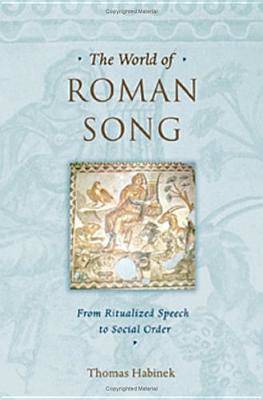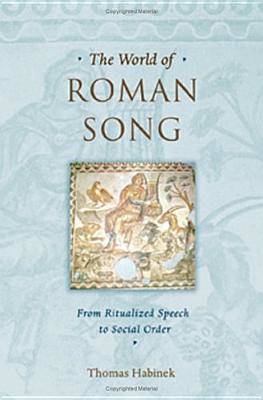
- Afhalen na 1 uur in een winkel met voorraad
- Gratis thuislevering in België vanaf € 30
- Ruim aanbod met 7 miljoen producten
- Afhalen na 1 uur in een winkel met voorraad
- Gratis thuislevering in België vanaf € 30
- Ruim aanbod met 7 miljoen producten
Omschrijving
Winner of the Classics and Ancient History award in the Professional and Scholarly Publishing Awards given by the Association of American Publishers
In this bold work, Thomas Habinek offers an entirely new theoretical perspective on Roman cultural history. Although English words such as "literature" and "religion" have their origins in Latin, the Romans had no such specific concepts. Rather, much of the sense of these words was captured in the Latin word carmen, usually translated into English as "song." Habinek argues that for the Romans, "song" encompassed a wide range of ritualized speech, including elements of poetry, storytelling, and even the casting of spells.
Habinek begins with the fraternal societies, or sodalitates, which predated the Republic and endured into the Imperial era, and whose rites, although adapted over time to different deities and cults, were from the beginning centered on song (perhaps most notably in the ancient Carmen Saliare). He goes on to show how this early use of song became a paradigm for cultural reproduction throughout Roman history. Ritual mastery of the chaos of everyday life, embodied and enacted in song, produced and transmitted the beliefs on which Roman culture was founded and by which Roman communities were sustained. By the emergence of the Empire, "song," in all of its senses, served in particular to reproduce the power of the state, organizing relations of power at every level of society.
The World of Roman Song presents a systematic and comprehensive approach to Roman cultural history. Informed and imaginative, this book challenges classicists, social theorists, and literary scholars to engage in a provocative discussion of the power of song.
Specificaties
Betrokkenen
- Auteur(s):
- Uitgeverij:
Inhoud
- Aantal bladzijden:
- 344
- Taal:
- Engels
Eigenschappen
- Productcode (EAN):
- 9780801881053
- Verschijningsdatum:
- 27/07/2005
- Uitvoering:
- Hardcover
- Formaat:
- Genaaid
- Afmetingen:
- 164 mm x 233 mm
- Gewicht:
- 598 g

Alleen bij Standaard Boekhandel
Beoordelingen
We publiceren alleen reviews die voldoen aan de voorwaarden voor reviews. Bekijk onze voorwaarden voor reviews.











